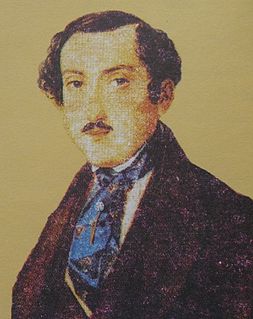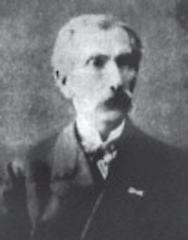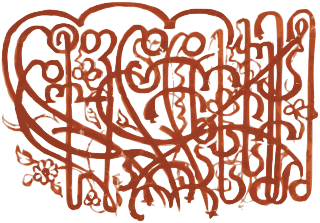 W
WPrincess Ana Gruzinsky-Golitsyna was a Georgian royal princess (batonishvili) of the Bagrationi dynasty of Mukhrani branch.
 W
WPrincess Anastasia of Georgia was a Georgian princess royal (batonishvili), a daughter of King Heraclius II of Georgia of his third marriage to Darejan Dadiani. She was married into the princely family of Eristavi, former Ducal House of Ksani.
 W
WAnton II the Great Martyr, born Prince Royal Teimuraz, was a member of the Georgian royal family and churchman. A son of Heraclius II, the penultimate King of Kartli and Kakheti, he was the Catholicos Patriarch of Georgia from 1788 to 1811.
 W
WBagrat was a Georgian royal prince (batonishvili) of the House of Bagrationi and an author. A son of King George XII of Georgia, Bagrat occupied important administrative posts in the last years of the Georgian monarchy, after whose abolition by the Russian Empire in 1801 he entered the imperial civil service. He was known in Russia as the tsarevich Bagrat Georgievich Gruzinsky. He is the author of works in the history of Georgia, veterinary medicine and economics.
 W
WPyotr Bagration was a Russian general and prince of Georgian origin, prominent during the Napoleonic Wars.
 W
WIoane was a Georgian prince (batonishvili), writer and encyclopaedist.
 W
WOkropir known in Russia as Tsarevich Okropir Georgievich Gruzinsky, was a Georgian prince royal (batonishvili) of the Bagrationi Dynasty.
 W
WTeimuraz Bagrationi otherwise known as Tsarevich Teimuraz Georgievich was a Georgian royal prince (batonishvili) and scholar primarily known as an author of the first critical history in Georgian as well as for his work to popularize interest in the history and culture of Georgia and preserve its treasures.
 W
WBrothers Zubalashvili — a family of businessmen and benefactors. The Zubalashvili family gained prominence in the seventeenth century and established themselves as successful merchants conducting business throughout Asia and Europe. They helped Kings Vakhtang VI and Erekle II establish printing presses in Tbilisi in the 18th century. After the Russian annexation of Georgia, the Zubalashvilis developed a profitable trade network that covered Russia, the Ottoman Empire, India, and Persia. In the mid-19th century, they also began establishing the first industrial plants in Georgia.
 W
WPrince Ilia Chavchavadze was a Georgian public figure, journalist, publisher, writer and poet who spearheaded the revival of the Georgian national movement in the second half of the 19th century and played a major role in the creation of Georgian civil society during the Russian rule of Georgia. He is Georgia's "most universally revered hero."
 W
WPrince Garsevan Chavchavadze was a Georgian nobleman (tavadi), politician and diplomat primarily known as the Georgian ambassador to Imperial Russia.
 W
WPrincess Nino Chavchavadze was a daughter of the famous Georgian knyaz (prince) and poet Alexander Chavchavadze and wife of Russian diplomat and playwright Alexander Griboyedov.
 W
WDavid Dadiani, of the House of Dadiani, was Prince of Mingrelia, in western Georgia, from 1846 until his death in 1853. A son of Levan V Dadiani, he became de facto ruler of Mingrelia on his father's retirement in 1840. Like his father, David ruled as an autonomous subject of the Russian Empire and served as a major-general of the Russian army. David presided over the frequently heavy-handed efforts to modernize Mingrelia's government, economy, and education. The Russian authorities, citing the Mingrelians' discontent with Dadiani's harsh measures, attempted, but failed to bribe him into resigning his office. David died of malaria at the age of 40.
 W
WPrince Konstantin Dadiani was a Georgian nobleman of the House of Dadiani and general of the Russian Imperial Army. During his nearly four-decade long military career, he fought in the Caucasian, Crimean, and Turkish wars.
 W
WMariam Dadiani was the last Queen Consort of the western Georgian kingdom of Imereti as the wife of King Solomon II. She was a daughter of Katsia II Dadiani, Prince of Mingrelia. After the Russian conquest of Imereti and Solomon's flight to the Ottoman Empire in 1810, Mariam fell in the hands of the Russian authorities who sent her in exile to Russia proper, where she was known as Maria Katsiyevna Imeretinskaya.
 W
WPrincess Salomé Dadiani was a Georgian princess, the only sister of Niko Dadiani, the last Prince of Megrelia.
 W
WDarejan Dadiani, also known as Daria, was Queen Consort of Kakheti, and later Kartli-Kakheti in Eastern Georgia, as the third wife of King Erekle II. She was a daughter of Katsia-Giorgi Dadiani, a member of the princely house of Mingrelia. Darajan married Heraclius in 1750 and their marriage lasted 48 years until his death in 1798; the union produced 23 children. In the final years of her husband's reign, Darejan exerted significant influence on politics and court affairs. She was skeptical of the pro-Russian policies of Heraclius II and his successor, her step-son, George XII, whose progeny she tried to prevent from succeeding to the throne of Georgia. After the Russian annexation of Georgia, Queen Dowager Darejan was deported to Russia proper in 1803. She died in St. Petersburg at the age of 69 and was buried at the Alexander Nevsky Lavra.
David Bagrationi, also known as David the Regent, was a Georgian royal prince (batonishvili), writer and scholar, was a regent of the Kingdom of Kartl-Kakheti, eastern Georgia, from December 28, 1800 to January 18, 1801.
 W
WGrigol was a Georgian royal prince (batonishvili) of the house of Bagrationi. A grandson of George XII, the last king of Georgia, and the only son of Prince Ioane of Georgia, he was briefly proclaimed as King of Georgia during a revolt against the Russian rule in 1812. After spending several months in a Russian prison, Grigol joined the Russian military ranks and took part in the 1813 Polish campaign. He is the author of several poems, memoirs, and a compilation of Georgian poetry.
 W
WIlia, also known as Elizbar (ელიზბარი), was a Georgian prince royal (batonishvili), a son of George XII, the last king of Kartli and Kakheti, by his second marriage to Mariam Tsitsishvili. After the Russian annexation of Georgia in 1801, Ilia accompanied his mother into exile to Russia. He then received military training and served in the Russian army, fighting with distinction at the battle of Borodino against the French in 1812 and retiring with the rank of colonel in 1823. He had 13 children of his marriage with Princess Anastasia Obolenskaya and his descendants, bearing the surname of Gruzinsky, have survived in the 21st-century Russian Federation.
 W
WPlaton Ioseliani was a Georgian historian and civil servant in the Imperial Russian service.
 W
WIulon was a Georgian royal prince (batonishvili) of the House of Bagrationi, born into the family of King Heraclius II and Queen Darejan Dadiani. He advanced claim to the throne of Kartli and Kakheti after the death of his half-brother George XII in 1800 and opposed the Russian annexation of Georgia until being apprehended and deported in 1805 to Tula. He died in St. Petersburg and was buried at the Alexander Nevsky Lavra.
 W
WPrincess Mariam Jambakur-Orbeliani was a Georgian noblewoman, philanthropist, educator, public figure and feminist.
 W
WLevan V Dadiani, of the House of Dadiani, was Prince of Mingrelia, in western Georgia, from 1804 to 1846. Succeeding on the death of his father Grigol Dadiani, he ruled—initially under the regency of his mother Nino from 1804 to 1811—as a loyal subject of the Russian Empire. Levan Dadiani took little interest in the details of government and resigned in favor of his son, David Dadiani, in 1840, remaining a titular Prince of Mingrelia until his death.
 W
WMirian was a Georgian prince (batonishvili) of the Bagrationi dynasty, born to King Heraclius II and Queen Darejan Dadiani. After Heraclius placed his kingdom under the Russian protectorate in 1783, Mirian entered the Russian army, attaining to the rank of major general. He reconciled with the Russian annexation of Georgia in 1801, departing to St. Petersburg, where he ended his days as a senator of the Empire. Of some literary talent, Mirian translated from Russian and himself composed poetry.
 W
WPrince Konstantine Bagration of Mukhrani was a Georgian nobleman from the House of Mukhrani. A member of the Russian Imperial Guard, Konstantine fought with distinction and died in World War I - actions for which he posthumously received the Order of St. George, the highest military decoration of the Empire. Konstantine was in a brief but controversial marriage with Princess Tatiana Constantinovna of Russia, a member of the Russian Imperial Family.
 W
WNikoloz "Niko" Dadiani, or Nikolay Davidovich Dadian-Mingrelsky, was the last Prince of Mingrelia from 1853 to 1867. Of the House of Dadiani, one of the leading Georgian noble families, he succeeded on the death of his father, David Dadiani, but he never ruled in his own right; during his minority, the government was run by regency presided by his mother, Princess Ekaterina, and in 1857, Mingrelia was placed under a provisional Russian administration. In 1867, Dadiani formally abdicated the throne and Mingrelia was directly incorporated into the Russian Empire. Dadiani mostly lived in Saint Petersburg, being close to the court. He was an officer in the Imperial Russian Army, distinguished himself in the Russo-Turkish War (1877–1878), and retired with the rank of major-general.
 W
WNino was a Georgian princess royal (batonishvili) as a daughter of King George XII of Georgia and princess consort of Mingrelia as the wife of Grigol Dadiani, Sovereign Prince of Mingrelia. After the death of her husband in 1804, Nino was a regent for her underage son, Levan until 1811, and helped bring Mingrelia and Abkhazia, a neighboring principality of her in-laws, under the hegemony of the Russian Empire. In 1811, she retired to Saint Petersburg, where she died at the age of 75.
 W
WCount Alexander Orbeliani (Jambakur-Orbeliani) was a Georgian Romanticist poet, playwright, journalist and historian, of the noble House of Orbeliani.
 W
WParnaoz was a Georgian prince (batonishvili) of the Bagrationi dynasty, the 14th son of Heraclius II, the penultimate king of Kartli and Kakheti, by his third marriage to Queen Darejan Dadiani. Parnaoz tried to challenge the recently established Imperial Russian rule in Georgia and in 1804 headed an unsuccessful insurrection of the Georgian mountaineers in the course of which he was arrested and deported to Russia. Afterwards, he spent most of his life in St. Petersburg, becoming the first Georgian translator of the 18th-century French philosopher Jean-Jacques Rousseau.
 W
WPrince Alexander of Georgia (1770–1844) was a Georgian royal prince of the Bagrationi family, who headed several insurrections against the Russian rule in Georgia. He was known as Eskandar Mīrzā (اسکندرمیرزا) in the Persian Empire, Tsarevich Aleksandr Irakliyevich in Russia, and as Alexander Mirza in Western Europe.
 W
WPrince Nikolay Pavlovich Shatilov was a nobleman and general of the Russian Empire. He was the son of Pavel Nikolaevich Shatilov who also served as a commanding officer. Nikolay Shatilov was responsible for pacifying regional unrest in the Caucasus and initiating several judicial reforms. He also participated in the 1877 Russo-Turkish war and was decorated with several awards. After retiring from service, he went back to Tbilisi where he spent the last years of his life.
 W
WSolomon II, of the Bagrationi Dynasty, was the last King of Imereti from 1789 to 1790 and from 1792 until his deposition by the Imperial Russian government in 1810.
 W
WPrincess Tekle was a Georgian princess royal (batonishvili) and poet. She was a daughter of Heraclius II, the penultimate king of Kartli and Kakheti, the wife of Prince Vakhtang Orbeliani, and mother of the Georgian literati, Alexander and Vakhtang Orbeliani.
 W
WPrincess Ana Giorgis Asuli Bagration-Gruzinsky was a Georgian royal princess (batonishvili) of the Bagrationi dynasty.
 W
WMariam, also known as Maria in European sources, was the Queen of Georgia as the second wife and consort of the last King George XII of Georgia.
 W
WVakhtang also known as Almaskhan (ალმასხანი) was a Georgian prince royal (batonishvili) of the Bagrationi dynasty, born to King Heraclius II and Queen Darejan Dadiani. He distinguished himself in the war with Iran in 1795 and was then active in opposition to his half-brother George XII of Georgia and the newly established Russian administration in Georgia. In 1802 he surrendered to the Russian authorities and spent the rest of his life in St. Petersburg, working on an overview of Georgia's history. In Russia he was known as the tsarevich Vakhtang Irakliyevich Gruzinsky.